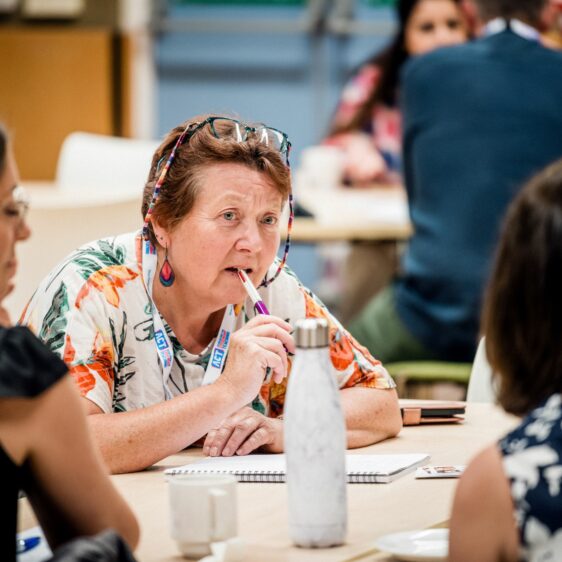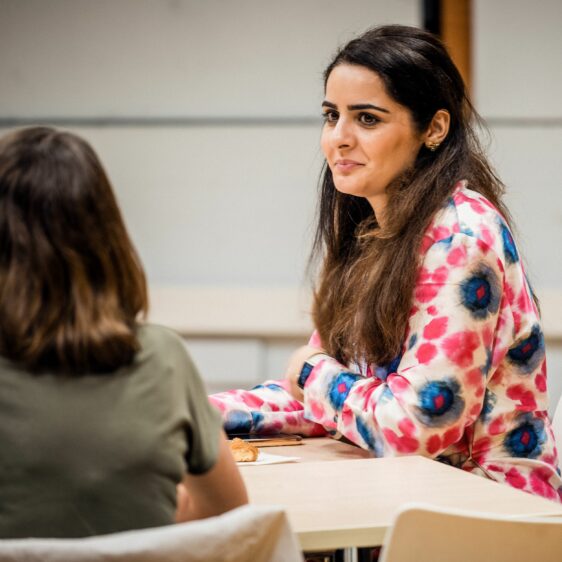
ACT's 5 Big Ideas for the future of Citizenship education
An inclusive, national education action plan for Citizenship and civic learning will strengthen democratic society
ACT, the subject association for Citizenship education, calls for a national education action plan for Citizenship and civic learning that can strengthen democratic society through education.
Over the past 6 months or so, ACT has been considering where Citizenship education should go next. Following conversations with our Teacher Council and Trustees, in the summer we held a policy forum to discuss some of our initial ideas – the 5 Big Ideas for Citizenship. We wanted to see how these resonated with others who work to support the subject in schools and colleges and what questions and ideas came forward.
The key objectives are to raise the status and quality of Citizenship education for every child, to encourage the development of democratic culture through our schools and colleges, and to build greater public understanding of the value of the subject.
Following feedback we have further developed the discussion paper and focussed on a call for a national education plan for Citizenship and civic learning. We think this could be overseen by the DfE and supported by actions in other departments such as the Cabinet Office and DSIT, who also have an interest in young people’s role and participation in democratic society.

1. REINVIGORATE THE TEACHING PROFESSION THROUGH CITIZENSHIP
Many teachers enter the profession because they want to make a difference. They are committed to making a positive change in society and believe in education that is broad, inclusive and fair for all. This is particularly true for Citizenship teachers and subject leaders, whose role in schools is to develop the knowledge, skills and understanding through the subject and develop young people who can play a full part in society as active, responsible citizens.
However, as we all know, in recent years the pressure on teachers has led to many leaving their roles. Could increasing the emphasis on Citizenship as a subject have the potential to reinvigorate, remotivate and retain our teachers? And if so, how could we achieve this?
Introduce funded bursaries for initial teacher training
As a subject, Citizenship attracts a broad range of people to the teaching profession, from all walks of life and backgrounds. Many go on to take leadership roles in schools thanks to the skills and expertise they have developed through Citizenship. Others make an additional contribution to their schools by teaching different social science and humanities subjects.
Let’s build the diversity of the trainee teacher community through Citizenship. For numbers and training providers to grow, we need to support the emerging specialism by providing subject funding in the form of bursaries and salaried trainee roles. We need to level the playing field by reducing the gap between subjects with a perceived higher status and Citizenship – the ‘have’ and ‘have not’ subjects.
Expand subject knowledge enhancement
As already noted, Citizenship attracts people from a wide range of degree subjects and life backgrounds to the teaching profession. To ensure that every prospective Citizenship teacher knows and understands the basics of the subject as a discipline rooted in the study of politics but also law, sociology and the economy. We recommend that a new offer of subject knowledge enhancement is completed before teacher training, to align Citizenship provision with other shortage subjects.
As the subject association for Citizenship and with our many different contacts in Universities and with other training and education organisations, ACT would be happy to lead the development of this.
Raise CPD professional standards and entitlements
Over the past 12 years, professional standards and CPD entitlements have been down graded in non-EBacc subjects like Citizenship. It is time to reverse this trend with an enhanced package of funded support for small and shortage subjects.
Schools need to be clear about the minimum expectations for subject-specific CPD for every teacher of Citizenship. We recommend that:
- revised professional development standards ensure every teacher has a basic grounding in Citizenship
- Citizenship subject teachers have at least five hours of funded, subject-specific CPD each year
- all CPD is certificated
ACT can lead the way on this initiative if some seed funding is provided.
Introduce funded lead practitioner status
We should recognise and value the role of Citizenship teachers who not only lead the subject – often with peers who are non-specialists – but also take on responsibilities for wider, whole-school issues. This demands adopting a similar approach to that used for careers education and guidance, which has led to a step change in many schools.
Putting in place a salary level commensurate with lead practitioner status will incentivise trained Citizenship teachers to stay with the subject. Too often, Citizenship teachers are either promoted to leadership roles or sadly leave the profession. Lead practitioner status would elevate Citizenship subject leaders, provide enhanced career opportunities, and offer motivation to teach for longer.
The funding could be held by the Chartered College of Teaching and linked to ongoing CPD in subject leadership and subject knowledge (provided by ACT in partnership with the Chartered College).

2. REBOOT THE SECONDARY CITIZENSHIP CURRICULUM
There are widespread concerns about the effects of populist politics on democracy, the rise of misinformation, enduring racism and discrimination, violence against girls and women, and the climate crisis. As a subject, Citizenship provides an invaluable opportunity for young people to critically evaluate, discuss and investigate topics like these and for teachers to provide impartial teaching about such issues which are political in nature.
During the last curriculum review in 2013, some of the core of Citizenship was removed and the subject’s intellectual and conceptual weight was reduced. We believe that a radical review of the secondary national curriculum as part of creating a reformed, creative and forward-looking curriculum will help ensure the subject of Citizenship:
- remains fit for purpose
- reflects the core subject concepts – including democracy, governance, rights, fairness, identity, diversity and active citizenship
- focuses on developing every young person as an informed, politically literate, active citizen within our democracy
- provides regular and meaningful opportunities for active citizenship and democratic engagement
As well as retaining key aspects of the existing teacher requirements, we recommend including the following specific content.
Media and information literacy of citizens and society
- Children’s right to information about matters that affect them (United Nations Convention of the Rights of the Child – UNCRC)
- The role of a free and fair media in democratic society
- Distinguishing between fact, opinion and mis-, dis- and malinformation
- How to protect privacy, data and build resilience to coercion and conspiracy
- The right of the media to investigate and report on issues of public interest and the responsibility for accuracy and respect for people’s privacy and dignity
Politics and democratic engagement
- The role of citizens in shaping public policy through local and national government, committees, and different forums, groups and campaigns
- How citizens can contribute to parliamentary democracy and hold those in power to account
- The process of parliamentary debate and deliberation on public issues as part of the process of making and shaping policy and legislation
- How digital democracy, social media and other measures can be used to improve political engagement, voting and participation of citizens in shaping decisions that affect society and to help citizens thrive in the digital age
Sustainability, environment and climate change
- The role of government and organisations in protecting the environment from degradation and harm
- Duty and role of those in power to protect citizens and the planet from the effects of climate change and with public policy that reflects the concerns of citizens and supports sustainable principles
- Roles and responsibilities of citizens in taking positive action to protect the environment from harm and seek sustainability in life and work
Human rights and equality
- Principles of human rights and equality – how these have developed and are an ongoing part of the struggle for justice and fairness, and how these are applied to real situations and contexts (reinstating the Key Stage 3 requirement that was removed)
- Anti-racist education to ensure students know and understand that racism and discrimination, in all forms, is unacceptable

3. MAKE PRIMARY CITIZENSHIP STATUTORY
For too long, the status of Citizenship in primary schools has been ambiguous. In 2014, the primary programme of study for Citizenship even went missing for a while (and was later reinstated by the DFE) after the 2013 curriculum review decided to focus on statutory subjects only.
Primary-aged children want to talk about the big issues of the day and deserve to benefit from Citizenship education. Younger children often see issues differently to teens and have the right to express their views on matters that affect them and be involved in decisions that affect them.
A radical update is needed to bring primary Citizenship up to date through a statutory programme of study. This will also help to provide a more secure basis on which to build secondary Citizenship education.

4. LEVEL THE PLAYING FIELD FOR CITIZENSHIP QUALIFICATIONS AND INCENTIVISE ACTIVE CITIZENSHIP TO 16 AND BEYOND
Levelling the playing field for public qualifications through the immediate removal of the EBacc measure would help to ensure schools are incentivised to provide breadth, balance and depth across the curriculum, including through Citizenship at Key Stage 4.
In the past year, the number of schools and colleges offering GCSE Citizenship Studies has risen by almost 15%. However, not all students have the opportunity to participate in the GCSE. To promote inclusion a wider range of awards needs to be developed and offered to create an entitlement to Citizenship to 16 and beyond.
Ofqual should review the accreditation of qualifications to ensure a fair approach. We think organisations that offer GCSE subjects like Citizenship should also be required to ensure there is provision for appropriate teacher CPD and support. Too often, decisions about teacher support are market-driven, with a higher level and quality of support available for subjects with a large entry. We know the level of support and resources available can be a key determinant for whether schools and colleges decide to offer a subject at GCSE.
Requiring awarding organisations to work alongside ACT as the recognised subject association will ensure teachers have high-quality support for all exam specifications for Citizenship and to explore multimodal assessment.
Where qualifications are not accessed, all Key Stage 4 students and those in post 16 education and training should still gain recognition for Citizenship through a graduation-style certificate that specifically acknowledges their active citizenship. ACT has recently developed a toolkit and Award for active citizenship that supports an inclusive approach, which could be developed further to provide national recognition.

5. EVERY SCHOOL A DEMOCRATIC CITIZENSHIP SCHOOL
It should become statutory for every school to have a Citizenship and School Democratic Culture Policy, the effectiveness and quality of which is evaluated as part of inspection of the subject and the whole school context. This would include:
- how, where and when the subject is taught in the curriculum
- who leads the subject in school
- who leads Citizenship on the school governing body
- how teaching controversial and sensitive issues is addressed
- how impartiality is maintained and upheld
- inclusion, equity and diversity both in the sense of what is taught and how (knowledge and practices)
- how the school builds a democratic culture underpinned by human rights and active citizenship, so that students are involved in school decision-making and have a real voice on matters that concern them
- how every child accesses regular opportunities for meaningful, democratic active citizenship experiences through the curriculum and wider enrichment activities throughout their school life (e.g. student parliaments, leadership roles, specialist groups championing key areas such as sustainability and the school environment)
We want every school to become a Democratic Citizenship School, supported by ethical leadership and governance and high-quality Citizenship is key to this.
We are keen to hear from teachers and others about our ideas. Please contact Liz Moorse, ACT Chief Executive and share your thoughts.
Email us: [email protected]